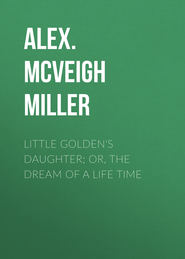По всем вопросам обращайтесь на: info@litportal.ru
(©) 2003-2024.
✖
A Dreadful Temptation; or, A Young Wife's Ambition
Настройки чтения
Размер шрифта
Высота строк
Поля
The physician knelt down and felt his heart and his pulse.
"He is dead," he said, shaking his head slowly and sadly. "I apprehended a fit the last time he consulted me, some three weeks ago. His mind and body were both weakening fast. This mournful end was not unexpected by me."
Mrs. St. John made a quick step forward.
She was about to say, "He did not die in a fit, doctor, he died of poison," when a hand like steel gripped her wrist.
She looked up and met the stern, awful gaze of Howard Templeton.
"Hush!" he whispered, hurriedly and sternly. "Let the world accept the physician's verdict. Say nothing of what you know. Do not brand his memory with the terrible obloquy of insanity and self-murder!"
As he spoke he turned away, and crossed the room, and as he passed the marble-topped table, it fell over, no one could have told how, and the bottles and glasses were shivered upon the floor.
One of the servants removed the debris, and mopped up the spilled wine from the floor, and no one thought anything more of it.
Yet, by that simple act, Howard Templeton saved his uncle's name and his own from the shafts of malice and calumny that must have assailed them if the terrible truth had come to light.
So the physician's hasty verdict of apoplexy was universally accepted by the world, and the old millionaire was laid away in his costly tomb a few days later, regretted by all his friends, and the secret of his tragic death was locked in the breasts of two who kept that hideous story sacred, although they were deadly foes.
Yes, deadly foes, and destined to hate each other more and more, for when the old millionaire's papers were examined, the beautiful widow found that she was foiled of her dearly-bought revenge at last.
For no will was found, although Xenie protested passionately that her husband had made a will the very last day of his life.
The most careful and assiduous search failed to reveal the existence of any legal document like a will, and the lawyers gravely assured Mrs. St. John that she could claim only a third of her deceased husband's wealth, the remainder falling to the next of kin, Howard Templeton.
"You see, madam," said the old lawyer, whom she was anxiously questioning, "if Mr. St. John had left a child, you could claim the whole estate as its lawful guardian, even without the existence of a will. But there being no nearer kin than Mr. Templeton, it legally falls to him, after you receive your widow's portion."
The young widow brooded over those words night and day.
She hated Howard Templeton more than ever.
She would have given the whole world, had it been hers, to wrest that fortune from her enemy's grasp, and leave him poor and friendless to fight his way through the hard world.
"Oh! if I only could find that will," she thought wildly. "Is it true that Mr. St. John made it, or was he deceiving me? He was utterly insane. Could one expect truth from a madman?"
Gradually, as weary weeks flew by, she began to believe that Mr. St. John had deceived her.
She felt quite sure in her own mind, after a little while, that he had never made the will.
He had fully meant for Howard Templeton to inherit his wealth.
Yet bitterly as she regretted its loss she could not bring herself to hate the memory of the old man she had married, and who had loved her for a little while with so fond and foolish a passion.
The memory of his dreadful death was too strong upon her.
She woke at night from dreadful dreams that recalled that last awful day of her husband's life, and lay shuddering and weeping, and praying to forget that fearful face, and blood-curdling, maniacal laugh that still rung in her shocked hearing.
"You are growing thin and pale, Xenie," Mrs. Egerton said, when she came to condole with her, more for the loss of the fortune than the loss of her husband. "People are talking of your ill looks, and they say you take Mr. St. John's death so hard, you must have cared for him more than anyone believed. I let them talk, for, of course, it is very much to your credit to have them think so, but as I know better myself, I cannot help wondering at your paleness and trouble."
"It was all so sudden and terrible," murmured the young widow, as she lay back in her easy-chair, looking very fragile and beautiful in her deep mourning dress.
"Yes it was very bad his going off in a fit that way," said her aunt. "Still, it was to be expected, Xenie. He was very old, and really growing childish, I thought. His going off without a will was the worst part of it. Of course it hurt you terribly for Templeton to have the money!"
The sudden flash in Mrs. St. John's dark eyes told plainer than words how much it had hurt her.
"However, Xenie, I would give over worrying about it," continued her aunt, soothingly.
"But my revenge, Aunt Egerton. Think how much I sacrificed for it. I married that foolish old man, and endured his caprices so long without a murmur, allowed myself to be shut up in solitude like a bird in a cage, and never murmured at his tiresome exactions. And all for what? Because I expected to get his whole fortune, and be revenged on the coward who broke my heart for the sake of it. And to be despoiled of my revenge like this is too hard for endurance," she exclaimed, walking up and down the room, and wringing her white hands in a perfect passion of despair and regret.
"Oh! let the wretch go," said Mrs. Egerton, complacently rustling in her silks and laces. "You have secured a large portion of the estate, anyhow. And you are so young and beautiful still, Xenie, you may even marry a greater fortune than that, when your year of mourning is expired."
Xenie stopped still in her excited walk, and looked at her aunt.
"I shall never marry again—never," she said earnestly. "I have as much money as I want, only—only I want to take that from Howard Templeton because I want to humble him and wring his heart. And there is but one way to do it, and that is to reduce him to poverty. Money is the only god he worships!" she added bitterly.
"He treated you villainously and deserves to be punished," said Mrs. Egerton, "but still I would try to forget it, Xenie. You will lose your youth and prettiness brooding over this idea of revenge."
"I will never forget it," cried Mrs. St. John, wrathfully. "I will wait and watch, and if ever I see a chance to punish Howard Templeton, I shall strike swiftly and surely."
Her aunt arose, gathering her silken wrappings about her tall, elegant form.
"Well, I must go now," she said. "I see it is of no use talking to you. Come and see me when you feel better, Xenie."
"I am going to the country next week," said her niece, abruptly.
"Indeed? Has not your mother been up to see you in your trouble?" inquired Mrs. Egerton, pausing in her graceful exit.
"No. I wrote to her, but she has neither come nor written. I fear something has happened. She is usually very punctual. Anyway, I shall go down next week and stay with them a week or two."
"I hope the change may improve your spirits, love," said her aunt, kissing her and going out with an airy "Au revoir."
CHAPTER VII
"Mamma, how pale and troubled you look. What ails you?"
Mrs. St. John was crossing the threshold of the little cottage home that looked, oh, so poor and cheap after the stately brown-stone palace she had left that morning, and after one quick glance into her mother's careworn face she saw that new lines of grief and trouble had come upon it since last they had met.
"Come up into my room, Xenie. I have much to say to you," said her mother, leading the way up the narrow stairway into her bedroom, a neat and scrupulously clean little room, but plainly and almost poorly furnished.
Mrs. Carroll was a widow with only a few barren acres of land, which she hired a man to till. Her husband was long since dead, and the burden of rearing her two children had been a heavy one to the lonely widow, who came of a good family and naturally desired to do well by her two daughters, both of them being gifted with uncommon beauty.
But poverty had hampered and crushed her desires, and made her an old woman while yet she was in the prime of life.
Xenie removed her traveling wraps and sat down before the little toilet glass to arrange her disordered hair.
"My dear, how pale and sad you look in your widow's weeds," said Mrs. Carroll, regarding her attentively. "I was very sorry to hear of your husband's death. It is very sad to be left a widow so young—barely twenty."
"Yes," answered Xenie, abstractedly; then she turned around and said abruptly: "Mamma, where is my sister?"
"He is dead," he said, shaking his head slowly and sadly. "I apprehended a fit the last time he consulted me, some three weeks ago. His mind and body were both weakening fast. This mournful end was not unexpected by me."
Mrs. St. John made a quick step forward.
She was about to say, "He did not die in a fit, doctor, he died of poison," when a hand like steel gripped her wrist.
She looked up and met the stern, awful gaze of Howard Templeton.
"Hush!" he whispered, hurriedly and sternly. "Let the world accept the physician's verdict. Say nothing of what you know. Do not brand his memory with the terrible obloquy of insanity and self-murder!"
As he spoke he turned away, and crossed the room, and as he passed the marble-topped table, it fell over, no one could have told how, and the bottles and glasses were shivered upon the floor.
One of the servants removed the debris, and mopped up the spilled wine from the floor, and no one thought anything more of it.
Yet, by that simple act, Howard Templeton saved his uncle's name and his own from the shafts of malice and calumny that must have assailed them if the terrible truth had come to light.
So the physician's hasty verdict of apoplexy was universally accepted by the world, and the old millionaire was laid away in his costly tomb a few days later, regretted by all his friends, and the secret of his tragic death was locked in the breasts of two who kept that hideous story sacred, although they were deadly foes.
Yes, deadly foes, and destined to hate each other more and more, for when the old millionaire's papers were examined, the beautiful widow found that she was foiled of her dearly-bought revenge at last.
For no will was found, although Xenie protested passionately that her husband had made a will the very last day of his life.
The most careful and assiduous search failed to reveal the existence of any legal document like a will, and the lawyers gravely assured Mrs. St. John that she could claim only a third of her deceased husband's wealth, the remainder falling to the next of kin, Howard Templeton.
"You see, madam," said the old lawyer, whom she was anxiously questioning, "if Mr. St. John had left a child, you could claim the whole estate as its lawful guardian, even without the existence of a will. But there being no nearer kin than Mr. Templeton, it legally falls to him, after you receive your widow's portion."
The young widow brooded over those words night and day.
She hated Howard Templeton more than ever.
She would have given the whole world, had it been hers, to wrest that fortune from her enemy's grasp, and leave him poor and friendless to fight his way through the hard world.
"Oh! if I only could find that will," she thought wildly. "Is it true that Mr. St. John made it, or was he deceiving me? He was utterly insane. Could one expect truth from a madman?"
Gradually, as weary weeks flew by, she began to believe that Mr. St. John had deceived her.
She felt quite sure in her own mind, after a little while, that he had never made the will.
He had fully meant for Howard Templeton to inherit his wealth.
Yet bitterly as she regretted its loss she could not bring herself to hate the memory of the old man she had married, and who had loved her for a little while with so fond and foolish a passion.
The memory of his dreadful death was too strong upon her.
She woke at night from dreadful dreams that recalled that last awful day of her husband's life, and lay shuddering and weeping, and praying to forget that fearful face, and blood-curdling, maniacal laugh that still rung in her shocked hearing.
"You are growing thin and pale, Xenie," Mrs. Egerton said, when she came to condole with her, more for the loss of the fortune than the loss of her husband. "People are talking of your ill looks, and they say you take Mr. St. John's death so hard, you must have cared for him more than anyone believed. I let them talk, for, of course, it is very much to your credit to have them think so, but as I know better myself, I cannot help wondering at your paleness and trouble."
"It was all so sudden and terrible," murmured the young widow, as she lay back in her easy-chair, looking very fragile and beautiful in her deep mourning dress.
"Yes it was very bad his going off in a fit that way," said her aunt. "Still, it was to be expected, Xenie. He was very old, and really growing childish, I thought. His going off without a will was the worst part of it. Of course it hurt you terribly for Templeton to have the money!"
The sudden flash in Mrs. St. John's dark eyes told plainer than words how much it had hurt her.
"However, Xenie, I would give over worrying about it," continued her aunt, soothingly.
"But my revenge, Aunt Egerton. Think how much I sacrificed for it. I married that foolish old man, and endured his caprices so long without a murmur, allowed myself to be shut up in solitude like a bird in a cage, and never murmured at his tiresome exactions. And all for what? Because I expected to get his whole fortune, and be revenged on the coward who broke my heart for the sake of it. And to be despoiled of my revenge like this is too hard for endurance," she exclaimed, walking up and down the room, and wringing her white hands in a perfect passion of despair and regret.
"Oh! let the wretch go," said Mrs. Egerton, complacently rustling in her silks and laces. "You have secured a large portion of the estate, anyhow. And you are so young and beautiful still, Xenie, you may even marry a greater fortune than that, when your year of mourning is expired."
Xenie stopped still in her excited walk, and looked at her aunt.
"I shall never marry again—never," she said earnestly. "I have as much money as I want, only—only I want to take that from Howard Templeton because I want to humble him and wring his heart. And there is but one way to do it, and that is to reduce him to poverty. Money is the only god he worships!" she added bitterly.
"He treated you villainously and deserves to be punished," said Mrs. Egerton, "but still I would try to forget it, Xenie. You will lose your youth and prettiness brooding over this idea of revenge."
"I will never forget it," cried Mrs. St. John, wrathfully. "I will wait and watch, and if ever I see a chance to punish Howard Templeton, I shall strike swiftly and surely."
Her aunt arose, gathering her silken wrappings about her tall, elegant form.
"Well, I must go now," she said. "I see it is of no use talking to you. Come and see me when you feel better, Xenie."
"I am going to the country next week," said her niece, abruptly.
"Indeed? Has not your mother been up to see you in your trouble?" inquired Mrs. Egerton, pausing in her graceful exit.
"No. I wrote to her, but she has neither come nor written. I fear something has happened. She is usually very punctual. Anyway, I shall go down next week and stay with them a week or two."
"I hope the change may improve your spirits, love," said her aunt, kissing her and going out with an airy "Au revoir."
CHAPTER VII
"Mamma, how pale and troubled you look. What ails you?"
Mrs. St. John was crossing the threshold of the little cottage home that looked, oh, so poor and cheap after the stately brown-stone palace she had left that morning, and after one quick glance into her mother's careworn face she saw that new lines of grief and trouble had come upon it since last they had met.
"Come up into my room, Xenie. I have much to say to you," said her mother, leading the way up the narrow stairway into her bedroom, a neat and scrupulously clean little room, but plainly and almost poorly furnished.
Mrs. Carroll was a widow with only a few barren acres of land, which she hired a man to till. Her husband was long since dead, and the burden of rearing her two children had been a heavy one to the lonely widow, who came of a good family and naturally desired to do well by her two daughters, both of them being gifted with uncommon beauty.
But poverty had hampered and crushed her desires, and made her an old woman while yet she was in the prime of life.
Xenie removed her traveling wraps and sat down before the little toilet glass to arrange her disordered hair.
"My dear, how pale and sad you look in your widow's weeds," said Mrs. Carroll, regarding her attentively. "I was very sorry to hear of your husband's death. It is very sad to be left a widow so young—barely twenty."
"Yes," answered Xenie, abstractedly; then she turned around and said abruptly: "Mamma, where is my sister?"











